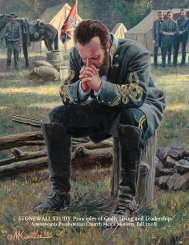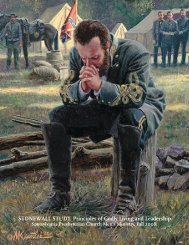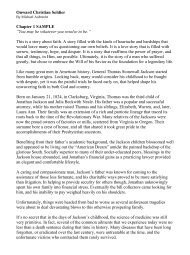PAR: Black Loyalists - Pinstripe Press by Michael Aubrecht
PAR: Black Loyalists - Pinstripe Press by Michael Aubrecht
PAR: Black Loyalists - Pinstripe Press by Michael Aubrecht
You also want an ePaper? Increase the reach of your titles
YUMPU automatically turns print PDFs into web optimized ePapers that Google loves.
Soldiers in the Ethiopian Regiment were<br />
outfitted in exceptionally striking uniforms<br />
embroidered with the phrase “Liberty to Slaves.”<br />
proper to declare, that all slaves who have been,<br />
or shall be seduced, <strong>by</strong> his lordship’s proclamation,<br />
or other arts, to desert their masters’ service, and<br />
take up arms against the inhabitants of this colony,<br />
shall be liable to such punishment as shall hereafter<br />
be directed <strong>by</strong> the General Convention. And to<br />
that end all such, who have taken this unlawful<br />
and wicked step, may return in safety to their duty,<br />
and escape the punishment due to their crimes, we<br />
here<strong>by</strong> promise pardon to them, they surrendering<br />
themselves…and not appearing in arms after the<br />
publication hereof. And we do farther earnestly recommend<br />
it to all humane and benevolent persons<br />
in this colony to explain and make known this our<br />
offer of mercy to those unfortunate people.”<br />
Patriot newspapers voiced paranoia and called for citizens<br />
to practice vigilance and increase security; restrictions<br />
on slave privileges, such as meeting in groups or conducting<br />
worship services, were immediately tightened. The Virginia<br />
Gazette published a stern warning to all slaves, stating:<br />
“Be not then…tempted <strong>by</strong> the proclamation to ruin your<br />
selves.” The publication also called Lord Dunmore a hypocrite,<br />
being a slaveholder himself, and ordered all servants<br />
to “cling to their masters.”<br />
These responses did little to prevent approximately<br />
300 slaves from joining Dunmore’s “Ethiopian Regiment”<br />
<strong>by</strong> December of 1775. They were outfitted in exceptionally<br />
striking uniforms embroidered with the phrase<br />
“Liberty to Slaves.” In all, it is estimated that close to<br />
800 men eventually joined the regiment, which did see<br />
some military action in Virginia at the battles of Kemp’s<br />
Landing and Great Bridge before smallpox took a deadly<br />
toll on the soldiers.<br />
The Ethiopian Regiment was disbanded in 1776.<br />
Three years later, British General Henry Clinton issued<br />
the Philipsburg Proclamation, which granted<br />
“every negro who shall desert the rebel standard<br />
full security to follow within these lines any occupation<br />
which he shall think proper.”<br />
This declaration, which was directed towards all slaves<br />
in the United States, instigated a resurgence of enlistees,<br />
many of whom were ironically put to work on captured<br />
plantations to grow food for the British Army.<br />
Regardless of whether they had been free or previously<br />
enslaved, black <strong>Loyalists</strong> fought with great courage and<br />
determination. One who certainly stood out was known as<br />
Colonel Tye. This former slave from Monmouth County,<br />
New Jersey, had served in the Ethiopian Regiment and<br />
fought for the British at the Battle of Monmouth. More<br />
notable, though, was the fact that he led a group of white<br />
and African American guerrillas in his home state and<br />
New York for most of 1779-1780, during which he and<br />
his men stole livestock, freed slaves, and captured and executed<br />
Patriots. In September of 1780, Tye was wounded<br />
while attempting to capture a Continental Army captain,<br />
and later died of infection.<br />
Of course, the Loyalist cause itself would eventually die.<br />
Life After Defeat<br />
In 1782, many black <strong>Loyalists</strong> fled to one of the last<br />
British strongholds in the United States: New York City.<br />
Once a provisional treaty was signed <strong>by</strong> Great Britain<br />
and the United States in November of that year, General<br />
Washington—under orders from Congress—demanded<br />
that before the British evacuated the city, they had to return<br />
all slaves who had been owned <strong>by</strong> Americans.<br />
8 www.patriotsar.com







